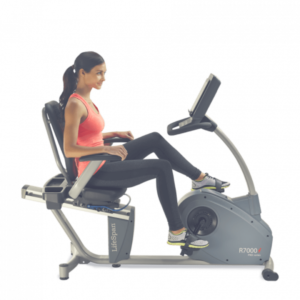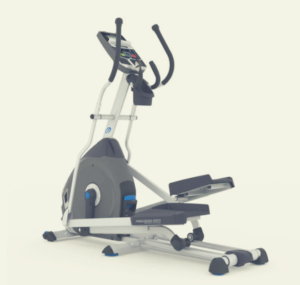Your metabolism determines the rate at which your body burns calories to fuel its various functions, including cell growth, breathing, digestion, and physical activity.
These calories can come from the food and drinks you consume, or your body can also use stored body fat as fuel.
However, over time or due to genes or various other factors, some people can experience a slow metabolism, which causes them to burn fewer calories and instead store them as body fat, thus resulting in weight gain.
And until now, there was no way to know if you had a slow metabolism.
But metabolism trackers, such as Lumen, which used to be used by clinics solely for professional athletes in training, now make it possible for you to know and from the comfort of your own home.
So, who should buy a metabolism tracker and why?
In short, a metabolism tracker is for anyone who wants to track their metabolism to learn the way their body uses carbs and stored fat for energy, so they can make the changes needed to improve their calorie-burning and thus transform their body.
Is a Metabolism Tracker For Me?
How Do Metabolism Trackers Work?
There are various metabolism trackers on the market today, and they each work differently and provide their own results.
However, the popular Lumen metabolism tracker works by measuring the level of carbon dioxide (C02) in your breath to determine whether your body is using fat or carbohydrates to fuel your body at the time.
Users simply blow into the sleek, handheld device for about 3 seconds, and the CO2 sensor and flow meter will indicate the results.
In general, when your CO2 level is low, it means your body is using stored fat for energy. On the other hand, a high C02 level means your body is using carbohydrates for energy.
The app will then provide you with professional recommendations on a personalized meal plan for the day, so you know what to eat and when to help maximize your metabolism and calorie burning.
It will also show you if you have enough energy before your workout or if you need to fuel up to help optimize your efforts.
The app also enables you to track your metabolism daily to see how it is affected by your sleep. This way, you can improve your efforts on all levels that affect your metabolism, including nutrition, fitness, and sleep.
It also integrates with most other popular fitness apps for a more well-rounded view of your health and fitness statistics.
Ultimately, the overall goal of a metabolism tracker is to, over time, help you achieve metabolism flexibility, which is the ability to adjust to changes in metabolic demand based on various conditions for effective weight management.
Top Metabolism Tracking Devices
| Bello Belly Fat Management Device | #1 Recommendation – Lumen | V2 KETOSCAN Mini |
 |
 |
|
| The Bello Belly Fat Management Device is made for those who are really focused on trying to rid themselves of that pesky visceral belly fat. | The Lumen Metabolism Tracker is by far our favorite metabolism tracker that is versatile and well made at an affordable price for those who take their metabolism tracking seriously. | The V2 KETOSCAN Mini is used by many on the Keto Diet that helps you track your fat burning rate and ketone levels. |
 |
 |
 |
Why is Metabolic Flexibility Important?
Metabolic flexibility is needed to maintain energy balance during times your caloric intake is low or vice versa.
Otherwise, metabolic inflexibility can interrupt the connection between metabolic pathways and mitochondria, which is associated with the onset of type 2 diabetes, high blood glucose, cardiovascular disease, cancer, and, of course, unhealthy weight gain, which also carries its share of health risks.
However, reports show that multiple factors, such as nutrient intake, the number of times you eat a day, and fitness training, can improve metabolic flexibility for overall improved health.
How Do I Know If I Have a Slow Metabolism/Low Metabolic Flexibility?
A slow metabolism/ low metabolic flexibility can be due to genetic factors or a lack of physical activity. Our metabolism also tends to slow down as we age.
However, no matter your reason for a slow metabolism, one sign that you have one is fast or significant weight gain, which can be caused byc onsuming more calories than you exert or the inability of your body to tap into your stored fat.
Another sign that you have a slow metabolism or low metabolic flexibility is that you may feel sluggish or tired easily due to a poor diet, insulin spikes, or a lack of exercise.
High levels of cortisol, which is often caused by chronic stress, can also slow your metabolism. It can also increase your appetite and cause insulin resistance, which can lead to weight gain.
Thinning hair, brittle nails, and dry skin can also be a sign of a slow metabolism due to a hormone imbalance, which affects your metabolism and ability to burn fat for weight loss.
A loss of muscle mass can also mean you have a slow metabolism, which can be a result of not enough exercise or not getting enough protein and calories.
In the meantime, another way to know if you have low metabolic flexibility is to review your flex score, which is provided by your metabolism tracker after about a month of daily tracking your morning measurements and measurements post high carb meals.
These scores often range from 0 to 21. A score closer to 21 typically means you have low metabolic flexibility.
How Can I Boost My Metabolism Using a Metabolism Tracker?
There are several steps a metabolic tracker recommends that you take to help boost your metabolism, including eating a low-carb diet, which one study shows significantly increases metabolism.
This is mainly because a diet high in protein boosts metabolism, controls hunger and sugar cravings, which help prevent insulin spikes, and increases muscle mass, which helps burn calories nonstop.
It also increases your body’s ability to burn fat, which, in turn, also helps you lose weight and maintain energy levels.
Hence, depending on your measurements, body type, and general health, a metabolism tracker may recommend meals that provide more protein and fat and fewer carbs to boost the number of calories your body burns each day.
However, some days, it may recommend that you eat more carbs to replenish your glycogen levels, which your muscles use for energy.
Some apps also let you choose menus based on your personal preferences, such as if you are vegan, vegetarian, have allergies, or just don’t like certain foods. This helps ensure you get meals you can reasonably enjoy, so you are more likely to stick to the meal plan and see results.
The metabolism tracker may also stress that you engage in regular low to moderate-intensity cardio and strength training because frequent exercise is also proven to help boost and maintain a healthy metabolism.
When your circadian rhythms, which control your hormones, body temperature, appetite, and more, are out of whack, it can also impact your metabolism.
So the metabolism tracker may also track your sleep patterns and then offer ways to achieve quality sleep, such as getting 7 to 9 hours of sleep each night to help regulate your circadian rhythms and maintain metabolic flexibility.
Intermittent fasting is also proven to help boost your metabolism, so the device’s app will typically also suggest that users avoid eating within 3 to 4 hours before bedtime and then for at least 12 hours overnight and into the next morning to promote strong mitochondria and insulin activity, which helps your body burn more fat and carbs during the day.
How Do You Know if You Have Metabolic Flexibility?
One of the overall effects of metabolic flexibility is the end of blood sugar highs and lows, which means your insulin levels are in check.
The benefit of balanced insulin levels is it helps prevent the angry, hungry feeling between meals. Instead, you may notice that you can now go hours before eating without feeling irritable.
Low insulin levels also prepare your body to burn fat rather than simply storing it, which also provides a few benefits.
For instance, when exercising, you may find that you can stay active for up to an hour or more without feeling hungry or losing energy.
This is because stored body fat supplies more calories than carbohydrates; therefore, it fuels your body longer.
It also helps preserve your body’s glycogen level, so it is available when your muscles need it, which helps boost endurance and maintain speed.
You may also notice that you can go longer before eating your first meal after long hours of overnight fasting because your body is able to use stored fat for fuel.
If you blow into your metabolism tracker and find that your C02 levels are fairly consistent each day, it may also mean that you have achieved metabolic flexibility.
How Soon Can You Achieve Metabolic Flexibility?
For many people, the initial stage of developing metabolic flexibility starts with adjusting to a low-carb diet to get your body used to burning fat for energy, which can take anywhere from 7 to 21 days to initiate.
Hence, you may notice a decrease in insulin spikes and a smaller appetite than usual during this time, which are some of the main benefits of metabolic flexibility, with more pronounced effects after day 7 and following.
However, it can take up to 2 years for your metabolism to fully adapt, depending on your unique body and how strictly you adhere to the professional advice provided by the metabolism tracker.
After this time, you will notice that even when you occasionally carb overload, your blood sugar levels won’t be as sensitive to it, and your body will also easily resume metabolic flexibility once you revert to a balanced diet.
Is a Metabolism Tracking Device Worth It?
Several reports show that metabolic flexibility helps stave off metabolic diseases, type 2 diabetes, cancer, obesity, and more.
So if protecting your health as part of your lifestyle is a major concern, then, yes, a metabolism tracking device is worth it because it provides you with the personal instruction you need to make the necessary changes to improve your health and fitness.
Metabolism tracking devices are also used by professional sports players in training to improve their athletic ability, so if you are an athlete or your goal is to train or compete like one, then a metabolism tracker can also be worth it to you.
A metabolism tracker is also especially useful if you have hit a plateau in your weight loss journey and have ceased seeing results because it can provide you with recommendations on how to adjust your nutrition for more effective workouts and calorie burning, so you can continue to improve.
Final Thoughts
So who should buy a metabolism tracker and why? Well, anyone who wants to take the guesswork out of knowing if they have a slow metabolism and who wants professional advice on what to do about it to help with weight loss and more.
They are also for those looking to get a more effective workout by knowing if and what they should eat before their session to properly fuel their bodies, so they don’t tire and can go the extra mile during their even most intense moves.
Since the overall goal of a metabolism tracker is to help improve the way your body uses carbs and fat for fuel, which helps balance insulin levels, they are also for those looking to decrease sugar cravings and hangry feeling between meals, which lead to overeating and weight gain.
Properly fueling your body also helps increase your energy levels, so they can also be used by those looking to boost their power and endurance naturally.
Lastly, metabolic inflexibility can lead to various health conditions, including type 2 diabetes, cancer, and more, so a metabolism tracker can also benefit those looking to improve their metabolic flexibility for better overall health.
A metabolism tracker app can also be integrated with other fitness and health apps for a more well-rounded approach to wellness.
Hence, if you fit into one of these categories, then a metabolism tracker is for you.
They also range in design, features, brand, and price to suit your individual budget and needs, so simply choose one based on your preferences.
Most metabolism trackers are also small and portable enough to fit into your travel bag or purse, so you can easily take them with you wherever you go to maintain your health and fitness regimen.





